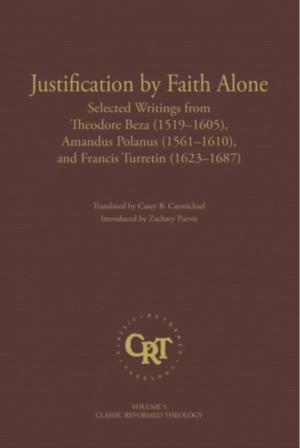Tom Hervey has published an interesting essay on the Aquila Report. In it he questions the legitimacy of “winsomeness” as a virtue. He is correct. It should be questioned. Continue reading
Author Archives: R. Scott Clark
Winsome Is The New Nice
Paul Contra Final Salvation Through Works (Romans 5:9–10)
For many evangelicals and for some ostensibly Reformed folk it has been fashionable for the last several years to teach that we are justified now by grace alone (sola gratia), through faith alone (sola fide), based on Christ’s righteousness imputed, but that . . . Continue reading →
One Arrested Every Day Since January 1, 2022
Jessica Chasmar has published what should be a blockbuster of a story. Continue reading
With Presbycast On Revival, Revivalism, And What Does “Evangelical” Mean?
The Presbycast (Brad “Chortles Weakly” Isbell and Wresbyterian) put up the bat signal yesterday so I filled in for the redoutable Chris Drew. There was some confusion over the number of episodes in which I have appeared. The correct number is 25. . . . Continue reading →
A Sunday Evening Bible Study Is Good But A Second Worship Service Is Better
Romans 10 On The Centrality Of The Official Preaching Of The Gospel
When I first began to become Reformed (c. 1980) I was familiar with the second service because my Southern Baptist congregation had an evening service. Indeed, we had a Wednesday evening service in addition to the Sunday morning service. Oddly, much to . . . Continue reading →
The Catechism Was Meant To Be Heard More Than Read
This year on the Heidelcast the HRA has been releasing an audio version of one question and answer of the Heidelberg Catechism daily 6 days a week. The first reason that we are doing this is to get the catechism into peoples ears, heads, and . . . Continue reading →
Against Berenson: Why Abortion Should Not Be Legal
The classic Reformed theologians distinguished between three uses of the moral law (e.g., the Ten Commandments): 1) the pedagogical use, whereby sinners come to know the greatness of their sin and misery; 2) the civil use, whereby the moral law—traditionally both tables . . . Continue reading →
New Resource Page: On Mainline (Liberal) Christianity In North America
The expression “mainline church” is drawn from an old-money neighborhood in Philadelphia known as “the main line.” The mainline churches were what are sometimes called the “tall steeple” church along the mainline. Scholars of American Christianity sometimes speak of the “Seven Sisters . . . Continue reading →
A Better Way To Say It
It has been said,”the gospel says that you are more sinful and flawed than you ever dared believe and you are more accepted and loved that you ever dared hope.” Continue reading
Pregnant, Scared, Confused? There Is Help
If you are struggling with an unplanned pregnancy or if you know someone who is, here are links to agencies that can help. They will not judge you but they will help you. You aren’t alone. Option Line Care Net Find a . . . Continue reading →
Supreme Court 9–0: Boston May Not Discriminate Against Christian Group
The SCOTUS unanimously ruled today, in Shurtleff v. City of Boston, that the City of Boston’s decision to exclude the “Camp Constitution” organization from a public flagpole, available to other groups, violated the Constitution of the United States. As Justice Kavanaugh explained, “This . . . Continue reading →
Should The Visible Church, As An Institution, Form And Express An Opinion On Political Violence?
s noted here previously, the mainline (liberal) PCUSA has adopted more than 120 positions on a bewildering variety of issues. The temptation to use the visible church to achieve one’s desired social goals is almost irresistible. Continue reading →
Trueman: It Is A Strange New World
Carl Trueman made a big splash by speaking uncomfortable truths to seemingly intractable power in The Rise and Triumph of the Modern Self (Wheaton: Crossway, 2020). In Strange New World: How Thinkers and Activists Redefined Identity and Sparked the Sexual Revolution (Wheaton: Crossway, 2022), . . . Continue reading →
Dear PCA, There Is Another Approach To Same-Sex Attraction: Rosaria Butterfield’s
One of the more strange aspects of the debate over Greg Johnson’s advocacy of “Side-B” homosexuality, the so-called “Gay Christian” approach, is that it has mostly ignored Rosaria Butterfield’s analysis of the issue and her experience. As one HB commenter wrote this . . . Continue reading →
The PCUSA Continues Its Slide Into Oblivion
Coming In December, 2022: Beza, Polanus, And Turretin On Justification
From its inception, the goal of the Classic Reformed Theology Series from Reformation Heritage Books (sponsor of the Heidelcast) has been to present, in English, primary source texts in Reformed theology. This new volume is the sixth in the series, which began . . . Continue reading →
Believer, You Are A Romans 7:25 Christian
Against The Presumption Of Perfectionism
Thanks be to God through Jesus Christ our Lord. Therefore, consequently, on the one hand, I myself serve the law of God with my mind but, on the other, with the flesh I serve the law of sin.”—The Christian Testimony of the Apostle Paul. Continue reading →
Jesus And Sinners
Jesus did welcome and eat with sinners of various kinds. Some of them were gross sinners but he did not endorse their sin nor make them a “protected class.” He loved them and called them to faith and for all those whom the Father gave him he laid down his life. Continue reading →
Rescuing Complementarianism
Those who study these things (e.g., historians, sociologists) write of three “waves” of feminism. First-wave feminism accounts for the women’s suffrage movement in the late 19th and early 20th centuries. Second-wave feminism is associated with the legalization of birth control (Griswold v . . . Continue reading →















